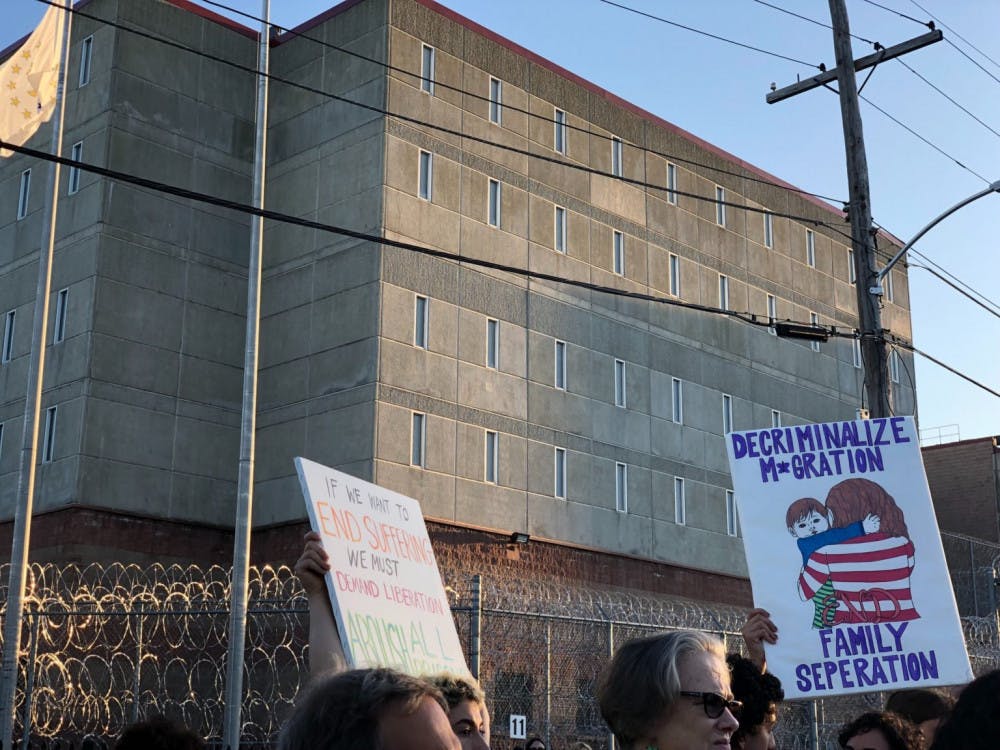To promote prison reform and work to halt operations of private prisons in Rhode Island, State Senator Jonathon Acosta, D-Central Falls, Pawtucket, and State Representative Joshua Giraldo, D-Central Falls, introduced four bills to the R.I. legislature Mar. 5.
These bills aim “to dismantle this system that incentivizes incarcerating people for profit,” Acosta told The Herald. Acosta believes that “the best legislators are the ones who copy the best practices,” so some of the bills he and Giraldo proposed are modeled after similar bills in California and New York. This suite of proposals will “start to recognize the effect of mass incarceration and the war on drugs.”
If the bills pass in their respective committees, they would then be presented and discussed on the House and Senate floors before being put to a vote. Following success on the floors, they would then be delivered to Gov. Dan McKee for approval.
The first bill (H5749, S0399) would prohibit the creation of new private detention facilities and partnerships between such facilities and public entities, according to a press release from the R.I. General Assembly. It would require currently operating private prisons — including quasi-municipal detention corporations such as the Donald W. Wyatt Detention Center — to close by the end of 2028.
“Private prisons are just for profit and not for rehabilitation,” said Catarina Lorenzo, director of Alliance to Mobilize Our Resistance, a grassroots organization that advocates and provides support for victims of hate crimes and state-sponsored violence in New England. “It’s just a corporation taking up space, brutalizing (and) caging people, treating them inhumanely and traumatizing people that have been detained in R.I. and Massachusetts.”
The Wyatt Detention Center owes bondholders over $100 million and is draining state funds, according to Giraldo. In his presentation of the bills, Giraldo explained that “Central Falls and Rhode Island have a for-profit prison sitting in the poorest city in the state,” which has resulted in not only a loss of revenue but also “numerous health violations, deaths and escapes.” Essentially, “the City is paying for (the Wyatt’s) services … (and) they’ve been able to get away with it,” Giraldo said.
Giraldo recognized that previous attempts to close prisons like the Wyatt faced challenges, but he remains optimistic about their chances now. “When you combine the finances of it, when you combine the immorality of it, when you combine the safety concerns … regardless of where your political leanings are, there’s a reason for you not to want (the Wyatt) here in Central Falls or in R.I. or in the United States for that matter,” he said.
The second bill (H5750, S0400) would prohibit contracts between the state and private, for-profit prison facilities or U.S. Immigration and Customs Enforcement.
In 2008, ICE suspended its contract with the Wyatt after Hiu Lui Ng, a detained New York software engineer from China, died in custody due to “vast medical negligence,” according to the R.I. American Civil Liberties Union Executive Director Steven Brown.
But in 2019, ICE began a new contract with the Wyatt, which authorized asylum-seeking young adults who crossed the Mexican-American border in Arizona to be detained in the Wyatt, according to Giraldo.
Because of this agreement, there are youths imprisoned in a “city full of immigrants, where many — either ourselves or our parents — took that same journey,” Giraldo said.
The third bill (H5751, S0394) would require a safety inspection of the Wyatt twice a year until its proposed closure in 2028. According to Acosta, the board currently appointed to oversee the facility is “largely symbolic,” as up until now, “safety has come secondary to paying bondholders.”
Wyatt spokesperson Christopher Hunter declined to comment on the proposed legislation.
Safety concerns within the Wyatt have heightened since the outbreak of COVID-19, The Herald previously reported. Even before over 450 COVID cases were reported, ICE detainees went on a hunger strike, protesting inadequacies in sanitation, social distancing and access to COVID testing, according to Sasha Berkoff, organizer for Never Again Action, a Jewish-led prison reform advocacy group.
In May, the R.I. ACLU filed a habeas corpus class action petition arguing for the conditional release of over 70 immigration detainees because of the disproportionate danger they faced during the pandemic resulting from the conditions in the Wyatt. Since this petition, the Wyatt has begun reporting its COVID-19 statistics biweekly under court order, as well as its efforts to contain the spread of COVID, such as designating a quarantine space, distributing masks and sanitizer and installing negative pressure units to act as a filter, Brown said.
The fourth bill (H5776, S0248) prohibits financial institutions in R.I. from investing in private detention centers. Although there may not be any investors in private detention centers, this bill would act as a preventative measure, according to Acosta.
The next step for passing these bills is for Acosta and Giraldo to present and defend them before they are voted on in their respective committees. On Mar. 15, Giraldo presented the first three bills in a hearing of the House Committee on State Government and Elections, where he says that they were “well-received by progressives and Republicans.” The fourth bill has been referred and presented to the House Corporations Committee, according to the press release.
Both AMOR and Never Again Action supported the suite of bills. Berkoff reported that over 150 people turned in a written testimony and over 60 people gave a verbal testimony in support of the bills at Giraldo’s presentation.
AMOR has encouraged prisoners, their families, AMOR volunteers and other community members who may support the bills to show support, Lorenzo said. Going forward, AMOR plans to speak with more state representatives and state senators to lobby further support, she added.
“Listening to the testimony and the questions other committee members asked during the house hearing left me pretty optimistic,” Berkoff said. “There’s also a compelling fiscal argument to close down the facility in addition to the … more compelling moral arguments for shutting it down.”

ADVERTISEMENT




